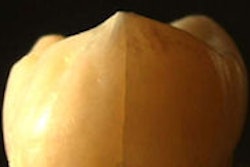
Have you ever wondered why a patient's teeth seem to dissolve before your eyes? The answer may lie farther down the esophagus. Children with chronic acid reflux are much more likely to have dental erosion than those without it, according to research presented at the recent Pediatric Academic Societies annual meeting in Baltimore.
“The easy thing when kids have GERD is to do lifestyle changes.”
— Melvin Heyman, M.D., chief of
pediatric gastroenterology,
hepatology, and nutrition,
UCSF Children's Hospital
"It's been suspected, but there's never been a controlled study that documented this," said Melvin Heyman, M.D., chief of pediatric gastroenterology, hepatology, and nutrition at the University of California, San Francisco (UCSF) Children's Hospital and the study's senior author, in an interview with DrBicuspid.com.
Working together, pediatricians and dentists investigated the teeth of 80 children ages 9 to 17 years. Sixty patients had symptoms of gastroesophageal reflux disease (GERD). Twenty more served as controls, with dental providers not knowing which patients had been diagnosed with GERD. The patients with GERD were six times more likely to have dental erosion, the researchers found.
GERD is defined as complications of gastroesophageal reflux into the esophagus. The muscular sphincter between the esophagus and stomach loosens, allowing contents from farther down the gastrointestinal tract back into the esophagus and sometimes into the mouth.
More than 75 million adults are suspected to be suffering from GERD, and some researchers place prevalence in the pediatric population to be as high as 22%. The disease may be on the rise. And left untreated, GERD can lead to ulcers and even precancerous changes in the lining of the esophagus.
Some of GERD symptoms, such as laryngeal disorders and esophagitis, can relate to the esophagus itself due to contact with gastric (acid and pepsin) and duodenal (bile acids and pancreatic enzymes) contents. Symptoms outside the esophagus may include coughing, chest pain, asthma -- and dental erosion.
Enamel weakened, dentin exposed
Erosion weakens the enamel and leaves the dentin exposed. This can lead to a permanent weakening of the teeth, a predisposition to tooth decay, and a need for major dental work to restore or disguise eroded teeth. Young children have even thinner enamel and dentin layers than adults, putting them at increased risk for erosion.
So what can be done?
"The easy thing when kids have GERD is to do lifestyle changes," Dr. Heyman said. "We're not going to stick every patient who has heartburn or spits up once in a while on an antiacid [medication]."
Obesity is a major risk factor for GERD, even though all the mechanisms are not precisely understood. Overeating can predispose a patient to reflux, Dr. Heyman said, but it's also assumed that the extra abdominal weight puts pressure on the abdomen, pushing the stomach contents up into the chest. "We want kids to lose extra weight," he said.
Other lifestyle factors affect the problem as well. "We want to avoid alcohol and any smoke, especially cigarette smoke, and caffeine," Dr. Heyman said.
But some habits are beneficial. "Interestingly, chewing [sugarless] gum seems to help," he said. "Chewing sugarless gum keeps saliva flowing down the esophagus."
If dietary and behavioral modifications are unsuccessful in resolving symptoms and preventing complications, medications and even surgery are sometimes necessary for GERD patients.
Dr. Heyman recommends that patients with extensive dental erosions seek medical care. "They should go to their doctor or pediatrician and decide whether they ought to see a gastroenterologist."
Meanwhile, dentists should attack the cause of erosion before fixing the damage, stated Johan Aps, D.D.S., Ph.D., a pediatric dental professor and researcher from Ghent University in Belgium, in an e-mail to DrBicuspid.com. "First find a solution to have less acidity in the mouth. If that is successful, one can start restoring the teeth with composites and crowns if necessary."
Treatment approaches to offset GERD effects on the teeth have traditionally been the use of fissure sealants, fluoride rinses, and sodium bicarbonate mouth rinses to buffer acidity.
Dr. Aps and Dr. Heyman agreed that a multidisciplinary approach is crucial to address the problem. "We need the pediatricians to work together with us [dentists], as they have all the medical information we don't have and vice versa," Dr. Aps said. "Oral health provides a better well-being for the patient, so why should they not be interested?"
Copyright © 2009 DrBicuspid.com



















